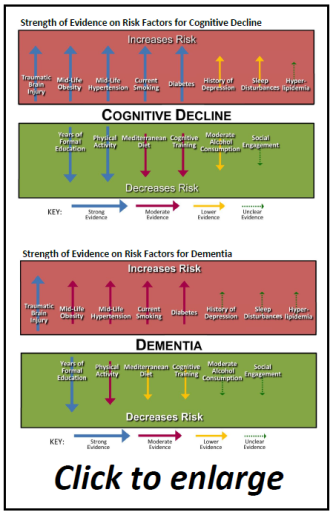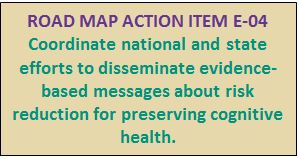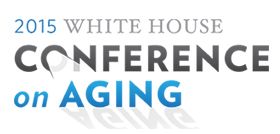Review of Evidence Confirms Potential of Risk Reduction for Cognitive Decline
 Participating in regular physical activity and managing certain cardiovascular risk factors (smoking, hypertension, diabetes, and obesity) reduces the risk of cognitive decline, according to an evidence review by the Alzheimer’s Association published in Alzheimer’s & Dementia earlier this month. This review adds to the growing scientific consensus, including a recent Institute of Medicine report, that modifying certain behaviors can protect cognition and support brain health. Participating in regular physical activity and managing certain cardiovascular risk factors (smoking, hypertension, diabetes, and obesity) reduces the risk of cognitive decline, according to an evidence review by the Alzheimer’s Association published in Alzheimer’s & Dementia earlier this month. This review adds to the growing scientific consensus, including a recent Institute of Medicine report, that modifying certain behaviors can protect cognition and support brain health.
 Based on an examination of the current state of the science, the analysis concludes there is sufficiently strong evidence, from a population perspective, to link physical activity and management of certain cardiovascular risk factors to a reduced risk of cognitive decline. The report notes that a healthy diet and engaging in lifelong learning may also reduce the risk (see image at right). Based on an examination of the current state of the science, the analysis concludes there is sufficiently strong evidence, from a population perspective, to link physical activity and management of certain cardiovascular risk factors to a reduced risk of cognitive decline. The report notes that a healthy diet and engaging in lifelong learning may also reduce the risk (see image at right).
To date, the only risk factors conclusively associated with dementia, according to the report, are formal education (more of it reduces the risk) and moderate to severe traumatic brain injury (it increases the risk). However, physical activity and cardiovascular risk management may also reduce the risk of developing dementia.
The authors call for expanding efforts to raise awareness and educate the public on ways to decrease their risk of cognitive decline, including by governments. The Public Health Road Map, a guidebook for public health officials to promote cognitive functioning – which was jointly developed by the Centers for Disease Control and Prevention’s Healthy Aging Program and the Alzheimer’s Association – encourages disseminating evidence-based messages about risk reduction for preserving cognitive health (action item E-04). Brain Health as You Age: You Can Make A Difference!, from the Administration for Community Living, is one existing resource  that public health professionals can use. You can also partner with your local Alzheimer's Association chapter to conduct workshops on ways individuals can care for their bodies and brains to age as well as possible. that public health professionals can use. You can also partner with your local Alzheimer's Association chapter to conduct workshops on ways individuals can care for their bodies and brains to age as well as possible.
Recent Webinars Feature Alzheimer’s Disease, Public Health Interventions
Three recent webinars highlighted the intersection of public health and cognitive issues. Recordings are now available. For additional information, please contact John Shean (jshean@alz.org).
 May 2015 – The Association for State and Territorial Health Organizations (ASTHO) held Using Data for Action to Promote the Health of Older Adults, discussing the connection between chronic disease and cognitive health and providing strategies for using data to shape public health programs and policies that promote older adults' health. May 2015 – The Association for State and Territorial Health Organizations (ASTHO) held Using Data for Action to Promote the Health of Older Adults, discussing the connection between chronic disease and cognitive health and providing strategies for using data to shape public health programs and policies that promote older adults' health.
 June 2015 – The Alzheimer’s Association hosted Public Health Implications of the IOM Report on Cognitive Aging, discussing the recent Institute of Medicine report, Cognitive Aging: Progress in Understanding and Opportunities for Action, and highlighting actions for the public health community. June 2015 – The Alzheimer’s Association hosted Public Health Implications of the IOM Report on Cognitive Aging, discussing the recent Institute of Medicine report, Cognitive Aging: Progress in Understanding and Opportunities for Action, and highlighting actions for the public health community.
 June 2015 – The White House Conference on Aging held a webinar on Alzheimer’s disease, focused on cognitive health, federal efforts to promote healthy aging and address Alzheimer’s disease, and tools that public health officials can use. June 2015 – The White House Conference on Aging held a webinar on Alzheimer’s disease, focused on cognitive health, federal efforts to promote healthy aging and address Alzheimer’s disease, and tools that public health officials can use.
The Alzheimer’s Public Health E-News is supported by Cooperative
Agreement #5U58DP002945-05 from the Centers for Disease Control and Prevention
(CDC). Its contents are solely the responsibility of the Alzheimer’s
Association and do not necessarily represent the official views of the CDC.
For subscription services or to view previous issues of Alzheimer’s Public Health News, please visit http://alz.org/publichealth/public-health-news.asp or contact John Shean (jshean@alz.org).
|